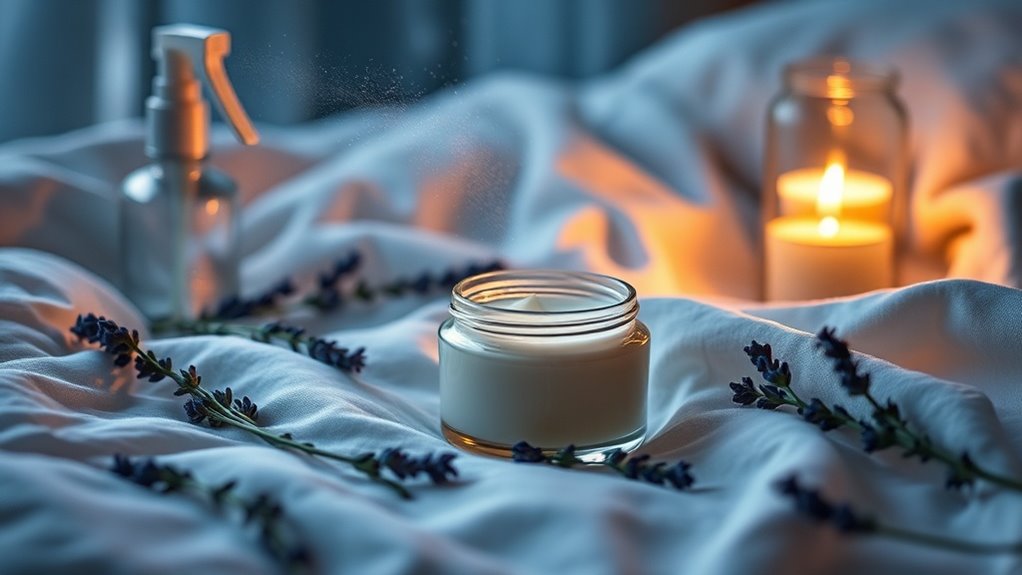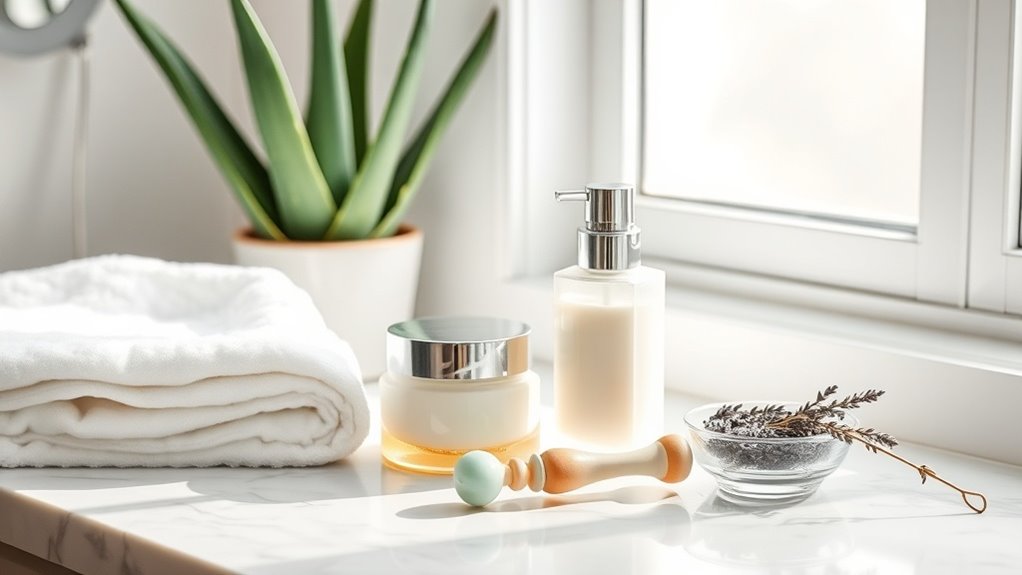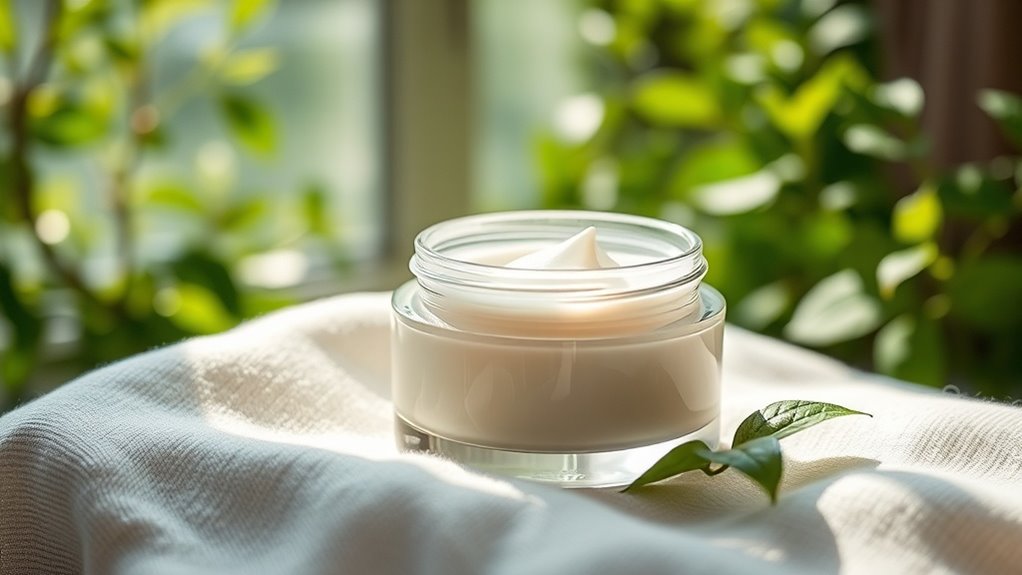The Ultimate Skincare Routine for Sensitive Skin
If you have sensitive skin, you know how crucial it is to choose the right products to avoid irritation. A well-structured routine can enhance your skin’s resilience and overall health. Starting with a gentle cleanser is essential, but there are specific considerations to ensure you’re effectively catering to your skin’s needs. Curious about how to build an effective regimen that works harmoniously with your sensitivity? The key lies in understanding each step.
Understanding Sensitive Skin
Sensitive skin is characterized by heightened reactions to various stimuli, leading to discomfort, redness, or inflammation. You might notice these responses from environmental factors, such as temperature changes, UV exposure, or specific skincare ingredients.
Identifying triggers is crucial to develop an effective routine for sensitive skin. Generally, this skin type lacks a robust barrier function, which allows irritants to penetrate easily. As a result, the skin may become dry and reactive.
To mitigate these issues, it’s essential to opt for gentle products devoid of common irritants like fragrances and harsh chemicals. Incorporating soothing agents, such as aloe vera or calendula, can also enhance your routine for sensitive skin. Additionally, understanding sensitive skin can help you make informed choices about the products and treatments you select.
Tailoring your approach can significantly improve your skin’s resilience and overall comfort.
Cleansing: Choosing the Right Cleanser
For individuals with heightened skin sensitivity, selecting the right cleanser is pivotal in maintaining skin health. Opt for gentle, fragrance-free formulas that avoid harsh surfactants known to irritate.
Look for cleansers labeled as “hypoallergenic” and “non-comedogenic,” as these are less likely to provoke allergic reactions or clog pores. Creamy or gel-based cleansers with soothing ingredients, like aloe vera or chamomile, can effectively cleanse without disrupting the skin barrier.
It’s crucial to avoid exfoliating cleansers containing acids or beads that can exacerbate irritation. Aim for products with a neutral pH to maintain skin balance. Additionally, choosing cleansers specifically formulated for specific skin type can further enhance your skincare routine.
Always perform a patch test before incorporating new products, ensuring compatibility with your skin’s unique sensitivities and needs.
Exfoliation: Gentle Techniques for Sensitivity
How can you effectively exfoliate without aggravating your skin? Start with gentle exfoliants, such as chemical exfoliants containing alpha-hydroxy acids (AHAs) or beta-hydroxy acids (BHAs). These compounds promote cell turnover without the harshness of physical scrubs.
For sensitive skin, consider using products with lower concentrations—around 5% AHAs or 1% BHAs—to minimize irritation. Limit exfoliation to once or twice a week, observing how your skin reacts. If you notice redness or stinging, reduce frequency or switch to milder alternatives like enzymes derived from papaya or pineapple.
Always follow exfoliation with a soothing serum or treatment to help calm the skin. Remember, patience is crucial in developing a routine that honors your skin’s sensitivity while promoting a luminous complexion. Additionally, incorporating a universal exfoliation method can further enhance your skin’s radiance without causing irritation.
Hydration: Importance of Moisturizers
Moisturizers play a crucial role in maintaining the skin’s barrier function, especially for individuals prone to sensitivity. They help prevent water loss, enhance skin hydration, and reduce irritation.
For effective hydration, consider these factors:
- Ingredient Selection: Choose products with gentle, hydrating ingredients like hyaluronic acid or glycerin.
- pH Balance: Opt for moisturizers with a balanced pH to minimize irritation.
- Non-Comedogenic Formulas: Select non-comedogenic options to avoid clogged pores while maintaining hydration.
- Frequency of Application: Apply moisturizers immediately after cleansing to lock in moisture and improve absorption.
Incorporating a suitable moisturizer into your skincare routine can significantly enhance skin tolerance and comfort, promoting overall skin health. Furthermore, using gentle cleansers in conjunction with moisturizers can further support the skin’s natural barrier and prevent irritation.
Sun Protection: Safe Sunscreen Options
When choosing a sunscreen for sensitive skin, it’s crucial to understand the differences between mineral and chemical options.
You’ll want to avoid certain irritant ingredients that can exacerbate your skin’s sensitivity.
Additionally, applying sunscreen correctly ensures maximum protection from harmful UV rays.
Mineral vs. Chemical Sunscreens
Understanding the differences between mineral and chemical sunscreens is crucial for effectively protecting sensitive skin from harmful UV rays. Each type has unique properties that can impact your skin’s health.
-
Mineral Sunscreens: Contain active minerals like zinc oxide or titanium dioxide, which physically block UV rays.
-
Chemical Sunscreens: Absorb UV radiation with organic compounds, often creating a chemical reaction that converts UV rays into heat.
-
Skin Tolerance: Mineral options are generally better tolerated by sensitive skin, while chemical formulations may irritate.
-
Application: Mineral sunscreens often leave a white cast on the skin, whereas chemical ones are typically clear.
Choosing the right sunscreen for your sensitive skin can make a significant difference in preventing irritation and protecting against UV damage.
Ingredients to Avoid
Although many sunscreens claim to provide effective protection, it’s essential to scrutinize their ingredient lists for potential irritants, especially if you have sensitive skin. Certain chemicals can exacerbate reactions, so always look for these common offenders.
| Ingredient | Reason to Avoid |
|---|---|
| Fragrance | Can cause allergic reactions and irritation. |
| Oxybenzone | Known to disrupt hormonal balance. |
| Octinoxate | May cause skin irritation and sensitization. |
| PABA | Often linked to skin allergies. |
| Alcohol Denat. | Can dry out and irritate sensitive skin. |
Application Tips and Techniques
Applying sunscreen effectively is crucial for maximizing protection against UV damage, especially for those with sensitive skin. To choose safe sunscreen options and apply them correctly, follow these tips:
-
Opt for mineral-based sunscreens: Choose formulas containing zinc oxide or titanium dioxide, as they’re less likely to irritate sensitive skin.
-
Apply generously: Use about a nickel-sized amount for your face and enough to cover all exposed areas of your body.
-
Reapply frequently: Every two hours, or immediately after swimming or sweating, to maintain protection.
-
Patch test new products: Apply a small amount on your wrist to check for any adverse reactions before using it on larger areas.
Following these techniques ensures optimal protection while minimizing irritation.
Nighttime Routine: Soothing Before Sleep
In your nighttime routine, choosing a gentle cleanser is essential to remove impurities without irritating sensitive skin.
After cleansing, applying a hydrating night cream helps restore moisture and support your skin’s barrier function.
Finally, incorporating calming essential oils can enhance relaxation and provide additional soothing benefits as you prepare for sleep. Additionally, introducing gentle products into your routine can further transform your skin by minimizing irritation.
Gentle Cleanser Choice
Choosing a gentle cleanser is essential for your nighttime skincare routine, especially if you have sensitive skin.
A suitable cleanser will effectively remove impurities without causing irritation. Look for products that meet these criteria:
-
Fragrance-Free: Fragrances can lead to allergic reactions; opt for unscented formulas.
-
Hydrating Ingredients: Choose cleansers with ingredients like glycerin or aloe vera to maintain moisture balance.
-
pH-Balanced: A cleanser with a pH close to your skin’s natural level (around 5.5) minimizes disruption to the skin barrier.
-
Foam-Free: Gel-based or cream cleansers are often milder and less stripping than foaming varieties.
Hydrating Night Cream
Because sensitive skin requires special care during the night, a hydrating night cream plays a crucial role in your skincare routine. This product restores moisture balance, replenishing lipids lost throughout the day.
Look for ingredients like hyaluronic acid, which can attract water to the skin, and glycerin, which helps maintain hydration. Ceramides are also beneficial, as they strengthen the skin’s barrier, reducing irritation.
Choose a cream free from fragrances and parabens to minimize the risk of allergic reactions. Apply the cream gently to clean, dry skin, ensuring full absorption.
Studies indicate that nightly application can improve overall skin hydration and enhance its resilience, leading to a more balanced complexion. Prioritize a hydrating night cream for optimal overnight repair.
Calming Essential Oils
Calming essential oils can significantly enhance your nighttime skincare routine by promoting relaxation and reducing sensitivity.
These oils possess anti-inflammatory properties, making them ideal for soothing irritated skin. Here are four essential oils to consider:
-
Lavender Oil: Known for its calming effects, it may help reduce skin redness and inflammation.
-
Chamomile Oil: Renowned for its soothing properties, it helps alleviate skin irritation and promotes a tranquil state.
-
Tea Tree Oil: While primarily an antiseptic, it can also reduce sensitivity due to its gentle nature when diluted properly.
-
Geranium Oil: This oil balances sebum production, providing hydration while calming inflammation.
Incorporate these oils into your routine to promote restful sleep and enhance sensitive skin resilience.




